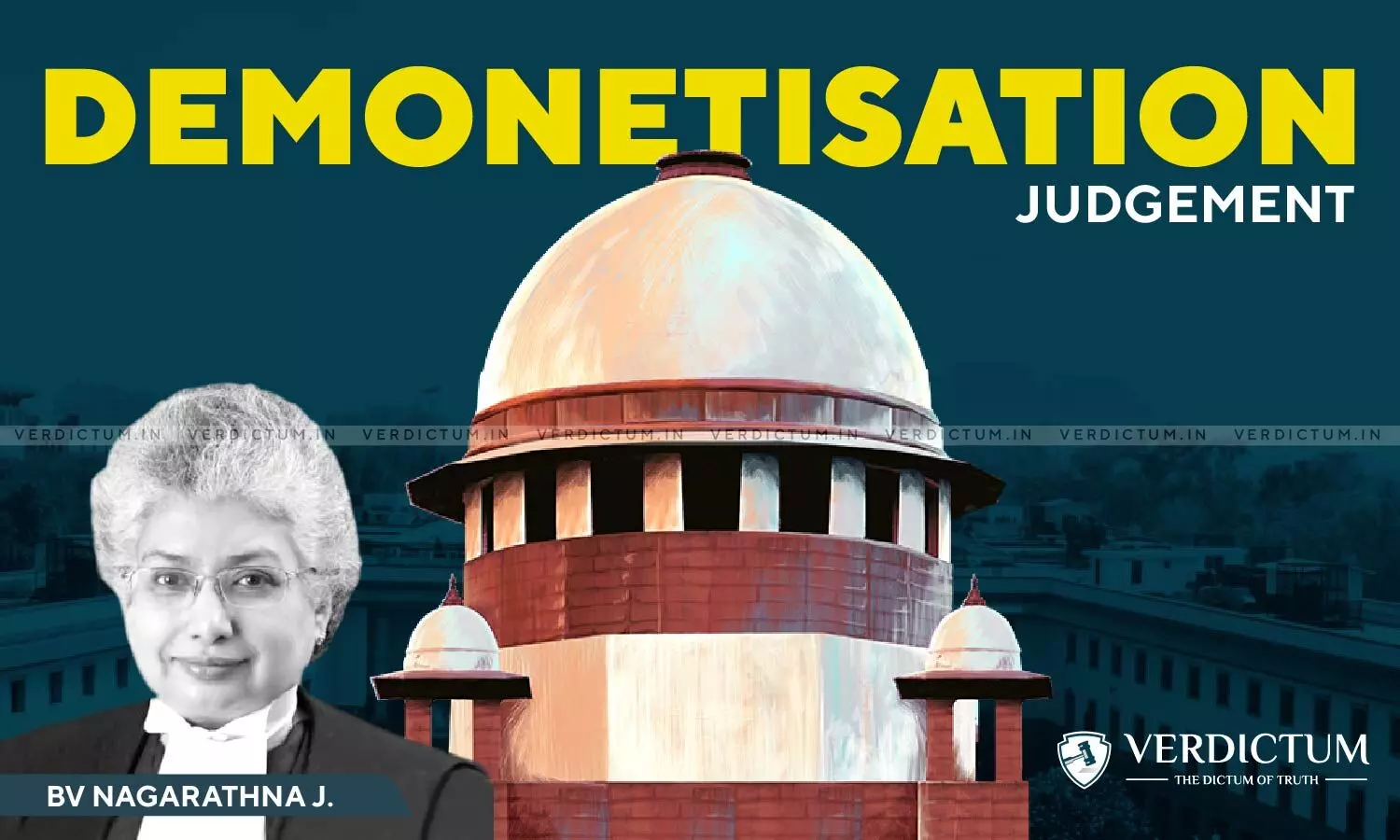
Demonetization Reflects Concern For Economic Security Of Country, Demonstrates Foresight: Justice Nagarathna In Dissenting Opinion
 |
|“The measure is reflective of concern for the economic health and security of the country and demonstrates foresight. At no point of time has any suggestion been made that the measure was motivated by anything but the best intentions and noble objects for the betterment of the nation”, Justice BV Nagarathna has observed in her dissenting opinion about the legality of the 2016 demonetisation.
A five-judge Constitution Bench headed by Justice S Abdul Nazeer, and comprising Justice B R Gavai, Justice A S Bopanna, Justice V Ramasubramanian, and Justice B V Nagarathna pronounced its verdict today after reserving its verdict on December 7. The majority judgment on behalf of 4 judges was authored by Justice Gavai upholding the decision of the government while Justice Nagarathna dissented on the legality of the action.
Justice Nagarathna also said her opinion, "I wish to observe that demonetization was an initiative of the Central Government targeted to address disparate evils plaguing the nation's economy, including practices of hoarding black money, counterfeiting, which in turn enable even greater evils including terror funding, drug trafficking, emergence of a parallel economy, money laundering, including hawala transactions. It is beyond pale of doubt that such a measure which was aimed at eliminating these depraved practices was well-intentioned".
Justice Nagarathna opined that the action of demonetization was an exercise of power contrary to the law, and therefore unlawful.
“The objective of the Central Government may have been sound, just and proper but the manner in which objectives were achieved and the procedure followed for the same, was not in accordance with law”, Justice Nagarathna ruled.
The measure has been regarded as unlawful only on purely legal stick analysis of the relevant provisions of the Act and not on the objects of demonization, the Judge clarified.
She said that the RBI Act does not envisage the initiation of demonetization of banknotes by the Central Government. Section 26(2) of the RBI Act contemplates demonetization at the instance of the Central Board of RBI.
In her minority opinion, she said that the Court is not to sit in judgment over the merit of finance or economic policy. She further noted that the scope of interference by a Court is limited to the instances where the impugned scheme or legislation in the economic arena has been enacted in violation of any constitutional or statutory provision.
Examining Section 26(2) of the RBI Act, she said that “examining this aspect of the matter would not amount to interfering with or sitting in judgment over the merits of the policy of demonetization and therefore, well within the limits of 'lakshman rekha' that this Court has carefully drawn for itself”.
She concluded that when the demonetization originates by way of recommendation of a Central Board of the Bank, Section 26(2) applies. However, when the proposal for demonetization originates from Central Government, as in the instant case, it is not under Section 26(2) of the Act. It is to be by way of a legislation.
“In my considered view, the powers of Central Government being vast, the same has to be exercised only through a plenary legislation or a legislative process rather than by an executive act by the issuance of a Gazette Notification”, said Justice BV Nagarathna.
It is necessary that Parliament which consists of representatives of the people of this country discusses the matter and thereafter approve and support the implementation of the scheme of demonetization. A Parliament is often referred to as a nation in miniature. It is the basis of democracy. Without a Parliament, a democracy cannot thrive. Parliament, the centre of our democracy, cannot be left aloof in a matter of such importance, Justice Nagarathna said in the lone dissenting opinion.
She observed that “when a statute contemplates a specific procedure to be adhered to, such procedure cannot be substituted by an alternative procedure which is not contemplated under the Statute”.